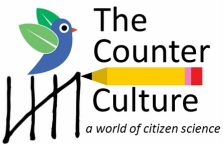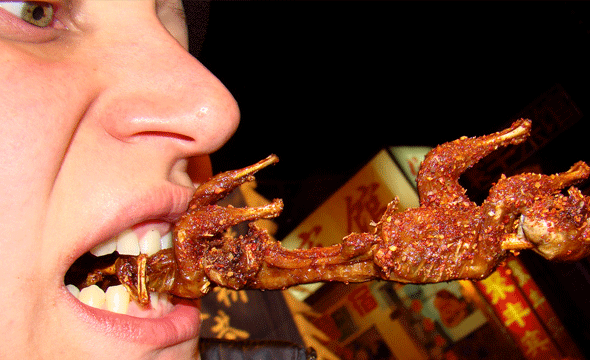Dennise Belmaker is the new Project Coordinator for the upcoming citizen science project: The House Sparrow Experiment.
|
We tend to battle and vilify invasive species, conveniently forgetting that Homo sapiens are the king of all invasive species. Our land-use habits alter species patterns globally, generally aiding invasive species. The most abundant invasive bird, the House Sparrow, evolved adaptations to live commensally with humans everywhere, from rural farms and densely populated cities. House Sparrows have probably existed with humans since the dawn of our time: archeologists have found sparrow bones over 100,000 years old in a cave near Bethlehem. We have a wide global distribution, and so they do too. Now they are obligate commensals, that is, if we abandon and area, they do too. In the coming months, I hope to learn more about House Sparrows. Smithsonian magazine has a fun article about evolution and ecology of House Sparrows, the most common bird in the world. Also, Kim Todd, Professor of English and Creative, sums of sparrows nicely in her book Sparrow, showing the play many roles in our culture, as innocent, invader, lover, and thief. Todd is a senior fellow in the Environmental Leadership Program (she's class of 2002, I'm class of 2011), and you can catch her ELP webinar about sparrows here. For starters, I want to appreciate house sparrows by looking at where they pop up in human history: our poems, prose, and recipes. In 1st Century BC, the Roman poet Gaius Catallus wrote in hendecasyllable meter (11 syllables per line):
Sparrows are mentioned in the Bible. When Jesus picked his 12 disciples and assigned them their mission, he warned them that they will be hated, told them to run when chased, and compared their value to that of sparrows. Matthew 10:29-31 tells it like this: Jesus said “Are not two sparrows sold for a farthing? And one of them shall not fall on the ground without your Father. But the very hairs on your head are all numbered Fear ye not therefore, ye are of more value than many sparrows.” Luke (12:6-7) tells it a little differently, Jesus says “Are not 5 sparrows sold for 2 farthings, and not one of them is forgotten before God?”
Obviously people bought and sold sparrows in Biblical times and perhaps put bounties on them with the intent of protecting crops. Why? I’m not sure, but probably as food (see recipes here and English 1769 recipe here), though possibly they were used as aphrodisiacs and in love potions too (Nicholas Culpeper wrote, "the brain of sparrows when eaten provokes the lust exceedingly"). The earliest known sparrow recipe, the Baghdad sparrow omelet, is from the 10th Century. It is fairly simple: Clean the sparrows and brown them in oil with dash of salt. Beat 10 eggs with black pepper and chopped cilantro. Pour egg mixture over the sparrows and fry until done, "and serve them, God willing." In early 1600’s, Shakespeare’s Hamlet says “There is special providence in the fall of a sparrow.” (meaning it is an omen of death). In the 1700’s, who killed cock robin? A House Sparrow was the culprit. In the 1700’s, William Blake’s The Blossom (in Songs of Innocence) contrasts sparrows and robins: Merry, Merry Sparrow! Under leaves so green A happy Blossom Sees you, swift as arrow, Seek your cradle narrow. Near my Bosom. Pretty, Pretty Robin! Under leaves so green A happy Blossom Hears you sobbing, sobbing, Pretty, Pretty Robin, Near my Bosom. In 1800’s, The Dog and The Sparrow, a fairy tale by the Brothers Grimm tells about man who tramples a dog and then is cleverly harassed by a sparrow until he loses his property and ultimately his life. In 1800’s, Emily Dickinson wrote about sparrows and although she would have seen New World sparrows, she wrote about the biblical ones, the House Sparrows. Her breast is fit for pearls, But I was not a 'Diver' - Her brow is fit for thrones But I have not a crest. Her heart is fit for home- I - a Sparrow - build there Sweet of twigs and twine My perennial nest I'm not one to critique poems or prose, but it sure seems many writers have used sparrows for sexual imagery. I would critique the recipes, but I'm not going to catch sparrows and try those. Well, maybe if times get really tough. After reading David Ng’s post about his goals and preparation for ScienceOnline 2013, I decided I should also get prepared and figure out my goals. Sharing these goals seems like an ideal way to start my first independent blog post on my new website. In doing so, I’m accomplishing one of my previously unarticulated meeting goals: start a personal blog which I can write with fewer inhibitions and thereby experiment until I find my blogging voice.
ScienceOnline is a big, exciting deal. It is one of the few times when science writers come together to talk face-to-face, and scientists and students who write can learn from the best. I’m incredibly excited to attend and participate for my FIRST time, but Ng’s post made me realize that I haven’t stopped to consider why I’m excited. I’m not just feeling contact-excitement, like a contact-high, from the contagious enthusiasm among writers and scientists that I follow on Twitter. I can quickly think of several reasons I’m eager: 1. I’ll get to meet everybody that I follow on Twitter! Well, not quite everybody I follow on Twitter will be there, but a high proportion of them. I’ll glean key advice and insights. Of course, this assumes that I will overcome my networking-phobias and introduce myself, and remember names, faces, and pseudonyms well enough to engage in conversations. I don’t expect it to be like meetings of biologists where we stand around, nod with (intended) intelligent expressions, and occasionally chuckle. ScienceOnline will be a group of communicators – certainly this is the one place where conversations will come easy to science nerds, albeit possibly in rapid exchanges of 140 character sentences. 2. I’ll get to meet people who write for a living – wow. What else can I say, but that is pretty cool. 3. I’ll get to meet people who are like me: scientists for a living and writers or bloggers in their spare time. 4. I’ll get to see Bora in his element as BoraZ rather than as a chronobiologist who I consult with about grant proposals because I like to hear him say “well, if I were still doing research, then what you have here is exactly what I’d want to do…”. 5. I’ll have an epiphany, no, I’ll have multiple epiphanies that help me find my blogging voice, that help me write my book, and that help me…recognize an epiphany when I have one, because that’s how far I still have to go. 6. I’ll co-moderate not one, but two sessions about citizen science. Not sure how this will play out. I know unconference supposedly means that everything is decided by the attendees, but I secretly think it is code for “skip sessions & mingle in the hall.” I’m a co-moderator because the organizers want to add newbies into the mix to diversify perspectives and attendees asked for sessions about citizen science, which is my area of expertise. I’m thrilled about these sessions because one is with THE science cheerleader, Darlene Cavalier, who is like pure energy, buzzing, crackling, lightning streaks, always in motion, and the other is with Holly Menninger, who is like an ideal college roommate, ready to stay up late, laughing and trying to figure out the meaning of the universe. 7. I’ll meet SciCurious. I’m curious how the secret identity thing works and will such people be dressed for a masquerade ball. 8. I’ll meet Carl Zimmer again, and hope he fondly remembers when a friend and I arranged for his Darwin Day visit to Ithaca. 9. I’ll find out who finds citizen science interesting and which of the many fascinating aspects have the most appeal. Maybe that will lead to some collaborative work in the future. 10. Maybe I’ll find a student science writer who is perfect to work for me this spring and summer with citizen science via the Great House Sparrow experiment! Job announcement coming soon! (part-time, temporary position) 11. I’ll visit my parents and siblings and my undergraduate alma mater. ScienceOnline is hosted at North Carolina State University, where I received my undergraduate degree. Go Wolfpack! Overall I expect ScienceOnline to be a great experience. My only worry is that it will push me out of the “ignorance is bliss” zone and into the “Medusa” zone. When I am very naïve about a topic and completely unaware that I shouldn’t be so comfortable with my lack of qualification, I can do anything – publish research about it in high profile journals, blog about it, speak about it – I try to make meaningful contributions. When I learn too much and fully recognize how little I know, then I might as well see the snakes on Medusa’s head because I’ll turn to stone, losing confidence to do anything. So, if I suddenly look at you as though your head has sprouted snakes and run the other direction, please take it as a compliment that your expertise is overwhelming. |
AuthorI'm Caren Cooper and @CoopSciScoop is my twitter handle. When I'm procrastinating, I will write here. ArchivesCategories |


 RSS Feed
RSS Feed
